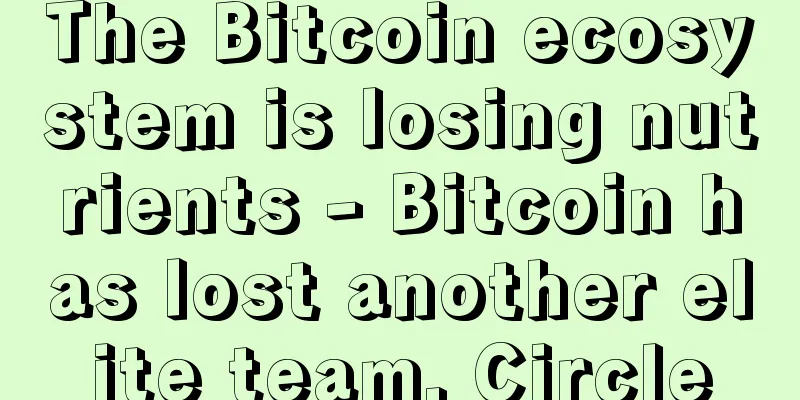The Bitcoin ecosystem is losing nutrients - Bitcoin has lost another elite team, Circle

Chapter 0 IntroductionOur country has long faced the dilemma of elite immigration. Unexpectedly, Bitcoin, which should have been a sunrise industry, is also losing its original elites. Circle, once a star Bitcoin startup that received $60 million in funding from investors including Baidu, is announcing today that it will cut ties with the Bitcoin economy and turn to blockchain. (News link: https://support.circle.com/hc/en-us/articles/217972003 ) Chapter 1: Core limits block size, making Bitcoin expensive and difficult to useLast month, a friend asked me on WeChat that the number of coins in his Bikan account had turned negative. Was it a bug in Bitcoin? Later, Liu from Bikan told me that it was because the Bitcoin transfer fee was too high. Users did not reserve enough fees for small OTC transactions, so they temporarily paid the fees to ensure that users' transactions could be confirmed as soon as possible. Bitcoin transaction fees have been rising since the block was full in April this year. The original transaction fee was as low as 0.1mbtc, but now it has become common that a fee of 0.5mbtc is required to get a quick confirmation. Even worse is the user experience. Before the block was full, almost all transactions could get a confirmation within 10 minutes. Now, using the dynamic fee recommended by any wallet cannot guarantee that the first block within 10 minutes will be confirmed. This does not give users an expected experience, which is really too bad. Satoshi Nakamoto predicted in the community that the blockchain would need to be expanded in the future and provided a solution for the expansion. When the Bitcoin block was filled to an average of 300Kb in 2013, three years ago, developer Gavin began to push for Bitcoin block expansion. The oldest developers, including Gavin and Jeff, predicted that the Bitcoin block would be filled within the next three years, and led the Core development team to promote hard fork expansion. However, the result of Core operating as a team was that a group of the best and most forward-looking developers such as Gavin and Jeff were squeezed out. Gavin and others were forced to form another development team to try to continue the glory of Bitcoin. In 2015, a team of Bitcoin entrepreneurs, mainly Chinese miners, began negotiations with Core, but after two years of hard work, to no avail. Core as a whole is even outright shameless when it comes to community speech, using a lot of speech control to deal with it. The best time for Bitcoin to expand has been missed. It has been running at full capacity for more than half a year, and the network effect of Bitcoin has also ceased for half a year. Core's block restriction has turned Bitcoin from cheap and convenient to expensive and difficult to use. It is even more difficult for Bitcoin to attract new users. Core's policies do not support companies in the Bitcoin ecosystem at all, making it difficult for companies to operate. In this context, it is natural for any idealistic team to cut ties with Bitcoin, and Circle, which has raised huge amounts of money, is no exception. Chapter 2: Core promotes anonymity, deviating from the development trend of mainstream human civilizationIt was hard to understand why Core was so stubborn about increasing the block size, which was beneficial to the entire community. Until the Milan Scaling Conference, Core completely revealed its cards. Many of the Core team members who hold great influence are people who hold anti-government ideas. Their primary goal is to make Bitcoin a currency that can resist government censorship. If the Bitcoin block is too large and the amount of data in the full node is too large, the ability to resist government censorship will be weakened. In particular, they also hope to be able to run the full node on the Tor network. At the Milan conference, the Bitcoin Core development team completely exposed their ideas. They controlled the entire meeting process and only discussed the anonymity of Bitcoin, not the expansion. They plan to do Mimblewimble, fungibility, CoinJoin, etc. on the Bitcoin main chain, with the goal of completely turning Bitcoin, a public blockchain, into an anonymous ledger. As for the Lightning Network, they don't care. People who understand know that 1M blocks are not enough to build a Lightning Network. Core wants to turn Bitcoin from a public ledger into a purely black anonymous ledger, which will ultimately make Bitcoin only a tool for criminals. This not only goes against Satoshi Nakamoto's will, but also goes against the ideals of almost all mainstream entrepreneurs and the vast majority of community members, and it goes against the mainstream trend of human civilization. The vast majority of users hope to see Bitcoin become a world-class application, rather than a money laundering coin, porn coin, gambling coin, or drug coin that is only used by criminals. Bitcoin's public ledger has caused a lot of public misunderstanding, the Silk Road legal case is still brewing, and Coinbase is dealing with the US government. If Core successfully guides Bitcoin towards anonymity, Bitcoin will inevitably move towards a state of full confrontation with the government and the public. It will be difficult for open, law-abiding and professional companies to provide services to consumers. Any entrepreneur with ideals and passion would not be willing to bet his or her business future on the purely black anonymous Bitcoin ledger. The departure of the Circle team is natural. Chapter 3: Core's high-pressure policy towards the Bitcoin community is causing Bitcoin to lose its entrepreneurial soil nutrientsIn the first half of this year, I tried to promote Bitcoin to a large number of strangers, and I found that the vast majority - more than 99% - of people thought that Bitcoin was a negative thing. Some people directly call Bitcoin a cult, which I think is a misunderstanding. However, in the past six months, I have seen that the most powerful people in Bitcoin - the core members of the Core team - use methods similar to the management mode of cults in managing the community. They will tell nine truths in ten sentences and mix in one lie. They will censor, delete posts and ban people from the battlefield of speech. They will hire a large number of water armies to launch wars of words and even publicly intimidate miners. Isn’t this a cult? No matter how the “believers” — including users, miners, and entrepreneurs — beg the “leaders” to show mercy and give them some block capacity, even 2M, the “leaders” have no intention of negotiation or reconciliation and insist on doing what they want. When Gavin and Mike released Bitcoin XT, Core hacked them as criminals who were trying to split Bitcoin. When Coinbase announced that it was testing Bitcoin XT, Core branded Coinbase as an altcoin company. When the miner Bitcoin Classic released a new version, Core accused Classic developer Tom Zander of creating a Bitcoin split. When Bitcoin Unlimited released the thin block Xthin, Core ruthlessly used conflicting enumeration values on the network to release dense blocks with the same functions, and insulted BU developers for not complying with the BIP development charter. When Viabtc adopted Bitcoin Unlimited for mining, Core advertised that Bitcoin Unlimited was an untested software. … Core as a whole has become a project that can hardly tolerate anything that goes against their wishes. Bitcoin has become their private garden, and entrepreneurs who want to plant some grass on it will not be allowed to do so, and they insult you as a "copycat coin". Bitcoin users and businesses are angry and outspoken about Core, but they are helpless. Circle's departure is of course inevitable. Chapter 4 ConclusionBitcoin is an open source project. Although many people have left in disappointment, as a member of the community, I am particularly grateful for their contributions to the Bitcoin ecosystem. |
<<: How blockchain can help fight cyberattacks
>>: ECB and Bank of Japan launch joint research project on distributed ledgers
Recommend
People whose emotions are easily influenced by the outside world
If a person is strong enough inside, then they ca...
Bitcoin features, advantages and disadvantages that Bitcoin players should know
Golden Finance News - Bitcoin has attracted the a...
What are the facial features of a man who is very noble?
If a man has a noble appearance, then his life wi...
What are the characteristics of a woman who is unlucky in marriage?
In ancient times, if a woman had a face that woul...
Checkpointing the UTXO set using the Merklix tree
In a previous post, I introduced Merklix trees as...
The face of a woman who is not content with mediocrity and pursues romance
Life is not always dull, and not everyone wants t...
How does U.S. law apply to non-U.S. digital currency companies?
贾里德•马克思is an attorney at Harris, Wiltshire & G...
WINGS and RSK Labs Enter into Technical Partnership to Advance Bitcoin DAO Development
WINGS will use RSK ’s open-source platform as the...
Is it good for a man to have a widow's peak?
Widow’s Peak: Is it good for a man to have a wido...
It is said that the "debt" has been paid and Bitmain will hold a conference in Hainan to promote sales (Bitmain Series 25)
Wu Blockchain exclusively learned that Bitmain wi...
DMG begins installation of 85 MW substation for cryptocurrency mining expansion
According to bitcoinst, blockchain and cryptocurr...
How to tell a woman's marriage from her facial features
Every woman hopes to have a happy marriage, and t...
China's central bank paper: Innovate the monetary system and vigorously develop digital currency based on human values
Author: Zou Pingzuo, Chief Researcher of the Fina...
The truth about Bitcoin investment
The author of this article is Thomas Tongutz, a c...
What does a mole on the right eye mean?
Eyes are the windows to the soul. If there are mo...









